About the Host
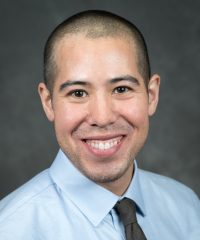
Dr. Nathaniel Chin is the creator and host of Dementia Matters. He is a geriatrician, memory clinic doctor, and medical director for the Wisconsin Alzheimer's Disease Research Center. His father's diagnosis with early onset Alzheimer’s disease inspired him to pursue a career as a geriatrician and scientist focused on dementia prevention, especially in regard to Alzheimer's disease.
Dementia Matters is a podcast about Alzheimer’s disease and other causes of dementia. Creator and host Dr. Nathaniel Chin interviews leading scientists and caregiving experts to bring listeners the latest in Alzheimer's disease news, research and caregiver resources.
Three Ways to Listen
You can listen to episodes through our website or subscribe to Dementia Matters through ApplePodcasts, Spotify, Podbean or wherever you get your podcasts. You can hear Dementia Matters on Fridays at 4 p.m. (CT) and again at 10 p.m. (CT) during the "Science Friday" segment on WMUU Radio, 102.9 FM in Madison, and streaming online.
Contact Us
Email your questions and episode suggestions to dementiamatters@medicine.wisc.edu.
Audio Editors: Eli Gadbury and Alexia Spevacek
Executive Producer: Caoilfhinn Rauwerdink
Producer: Amy Lambright Murphy
Make an Impact
Like what you’re hearing and learning? Make an impact when you make a tax-deductible gift to the Dementia Matters fund of the UW Initiative to End Alzheimer’s.
Recent Episodes
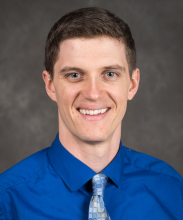
A recent study showed that research participants in the most highly disadvantaged neighborhoods had smaller hippocampal areas compared to research participants in more advantaged neighborhoods. The study’s first author explains the results and the tools researchers used to measure neighborhood disadvantage.
Guest: Jack Hunt, PhD, University of Wisconsin School of Medicine and Public Health Medical Scientist Training Program
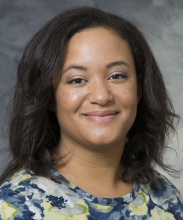
COVID-19 Special Series The pandemic has placed a significant strain on the mental, social, and physical wellbeing of many caregivers, as well as individuals with cognitive decline. Our guest discusses COVID-19’s impact on underserved communities, offers communication tips, and reminds people to practice self-care.
Guest: Andrea Gilmore-Bykovskyi, PhD, RN, University of Wisconsin-Madison School of Nursing
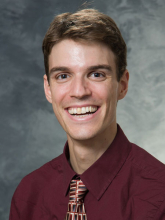
COVID-19 Special Series Stress, fear, and anxiety are common responses to the uncertainty during the COVID-19 pandemic. However, with the regular practice of mindfulness, the meditative process of bringing your attention to your body in the present moment, has been seen to help calm the worry. Our guest joins us to discuss using mindfulness methods to maintain and mange an overall wellbeing.
Guest: Vincent Minichiello, MD, University of Wisconsin School of Medicine and Public Health
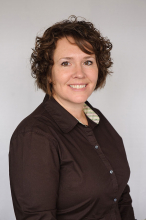
COVID-19 Special Series As a result of the COVID-19 pandemic visiting and communicating with people living with memory loss, whether at home or in a care facility, has become more difficult. Our guest joins us to outline the different ways to communicate remotely, how rural communities are adapting to this change and methods to help caregivers cope.
Guest: Becky DeBuhr, MS, Program Director, Alzheimer’s & Dementia Alliance of Wisconsin.
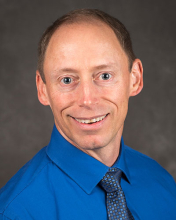
COVID-19 Special Series The field of telemedicine offers a diverse range of medical support services through telecommunication. Under the global pandemic, many providers have moved to telemedicine to assist their patients. Our guest discusses the advantages and disadvantages to using video and phone doctor visits and offers tips for best use of the services.
Guest: Steve Barczi, MD, University of Wisconsin School of Medicine and Public Health
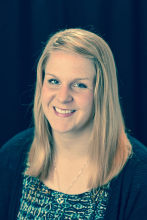
COVID-19 Special Series This episode discusses the work done by The Alzheimer’s Association, an organization focused on providing community education and assistance to all affected by Alzheimer’s disease or other dementias. Our guest details how care and support services have quickly adapted to keep families and loved ones safe, healthy, and connected under quarantine.
Guest: Kate Kahles, Program Manager, Alzheimer's Association Wisconsin Chapter
COVID-19 Special Series The National Family Caregiver Support Program (NFCSP) offers information, support, and resources to assist family caregivers (spouse, adult child, other relative, friend or neighbor) with their concerns related to caregiving. COVID-19 has impacted many resources and supports. Funding is available to help. This episode delves into what the program offers and ways to support caregivers and care recipients especially during the pandemic
Guest: Jane DeBroux, Caregiver Program Coordinator, Dane County Area Agency on Aging
COVID-19 Special Series This episode continues our conversation with Art Walaszek, MD, focusing on the psychological and behavioral effects of the COVID-19 pandemic. Our guest helps us understand the fears and anxieties that are heightened during this time and recommendations to help best handle the increased stress.
Guest: Art Walaszek, MD, Geriatric Psychiatrist, University of Wisconsin School of Medicine and Public Health
Maintaining Mental Health During a Pandemic Part 1: Consequences of Isolation & Tips to Prevent Them
COVID-19 Special Series This episode begins our pivot to addressing the important issues facing individuals during the current COVID-19 pandemic. We will speak to researchers and doctors discussing the present and future impact of the pandemic on those with cognitive impairment and those without. We are starting with a two-part series on the psychological and behavioral consequences of the pandemic. Our guest, Art Walaszek, MD, speaks on the effects of social distancing and how individuals or caregivers can stay healthy during this time.
Guest: Art Walaszek, MD, Geriatric Psychiatrist, University of Wisconsin School of Medicine and Public Health
This episode offers an overview of the current tools doctors use to examine Alzheimer’s disease risk in their patients, as well as new techniques in development. Our guest discusses the science behind risk testing for dementia, as well as the potential for a low-cost risk test.
Guest: Sanjay Asthana, MD, associate dean for gerontology at the University of Wisconsin School of Medicine and Public Health and director at the Wisconsin Alzheimer’s Disease Research Center
This episode explores genetic risk factors for early- and late-onset Alzheimer’s disease. Host Nathaniel Chin and guest Corinne Engelman discuss the research looking into genetic risk for Alzheimer’s disease and the uncertainty that comes with genetic testing.
Guest: Corinne Engelman, MSHP, PhD, associate professor, Department of Population Health Sciences, University of Wisconsin School of Medicine and Public Health
Our guest, Dr. Kimberly Mueller, joins us to discuss cognitively stimulating activities and the impact of social engagement on brain health. Guest: Kimberly Mueller, PhD, CCC-SLP, Assistant Professor, Department of Communications Sciences and Disorders, University of Wisconsin-Madison
Episode Topics:
- What are cognitively stimulating activities? 1:25
- Recent studies: 2:50
- Are some activities better than others? 9:00
- Are Jeopardy or other “active” television shows considered cognitively stimulating? 10:23
- Are board games, crossword puzzles, and brain games considered cognitively stimulating activities? 11:22
- Is there evidence showing the benefits of social engagement? 15:08
- Advice for maintaining and strengthening brain health: 18:37
In this bonus episode, we continue our conversation with Dr. Howie Rosen on Frontotemporal Dementia (FTD). On last week’s episode, Dr. Rosen spoke on the genetic risk factors, trajectories and family caregiving experiences of FTD. Now, our conversation turns to the research looking into how the disease affects self-awareness, biomarkers and early detection, as well as ways people can volunteer for a research study. Guest: Howard “Howie” Rosen, MD, behavioral neurologist at the University of California San Francisco Memory and Aging Center
Episode Topics:
- FTD and self-awareness: 1:10
- Research into biomarkers for Frontotemporal Dementia: 4:42
- How can people help the research: 11:40
Frontotemporal dementia (FTD) is a type of dementia caused by degeneration in the temporal and frontal lobes of the brain. Our guest discusses the symptoms, risk factors, prevalence, and course of the disease, along with information on how a doctor diagnoses FTD and what families and caregivers can do after diagnosis. Guest: Howard “Howie” Rosen, MD, behavioral neurologist at the University of California San Francisco Memory and Aging Center
Episode Topics:
A definition of Frontotemporal Dementia (FTD) 1:02
How common is FTD? 3:53
Genetic risk factors of FTD: 4:30
Non-genetic risk factors of FTD: 6:40
Symptoms of FTD: 8:40
How a clinician diagnoses FTD: 14:03
What is the course of the disease? 16:20
What to do after a diagnosis: 18:51
Family and caregiver experience of FTD: 22:36
Community support and networking: 25:53
Our guests, Dr. Rebecca Koscik and Dr. Tobey Betthauser, are researchers investigating the trajectory of amyloid and tau proteins over time and the significance of amyloid chronicity. Koscik and Betthauser discuss their two recent publications on the topic and how amyloid PET scans have helped scientists better understand the early brain changes associated with Alzheimer’s disease. Guests: Rebecca Koscik, PhD, senior scientist, Tobey Betthauser, PhD, postdoctoral fellow, University of Wisconsin-Madison
In this episode, we discuss ...
- How amyloid PET tracers work 7:17
- Published research on amyloid duration 12:01
- Research supporting amyloid chronicity 18:14
Our guest is Dr. Sterling Johnson, associate director of the Wisconsin Alzheimer’s Disease Research Center and principal investigator of the Wisconsin Registry for Alzheimer's Prevention (WRAP) study at the University of Wisconsin-Madison. The WRAP study is one of the largest and longest-running observational studies of Alzheimer's disease in the world. Dr. Johnson shares study findings, discusses advancements in brain imaging, and introduces the concept of amyloid chronicity. Guest: Sterling Johnson, PhD, professor of medicine (geriatrics), University of Wisconsin School of Medicine and Public Health
Show Notes:
- What is the WRAP study? 3:28
- Findings from the study: 8:06
- WRAP studies outside of Wisconsin: 10:59
- What is amyloid chronicity? 15:19
Dr. J. Neil Henderson is an expert on diabetes and dementia, as well as creating culturally specific caregiver training programs for people who care for American Indian elders. Dr. Henderson, who is Oklahoma Choctaw, discusses cultural influences on caregiving and his work in improving brain health among American Indians and rural populations. Guest: J. Neil Henderson, PhD, professor, University of Minnesota School of Medicine, Duluth campus; executive director, Memory Keepers Medical Discovery Team on Health Disparities
Show Notes:
-
Trainable caregiving skills: 1:07
-
Impact of culture on caregiving: 6:29
-
American Indian and rural health disparities in memory: 10:35
People diagnosed with Alzheimer’s disease before the age of 65 are said to have early-onset Alzheimer’s disease. While this diagnosis is rare, the condition is very serious for the patient and their loved ones. Our guest helps define the disease and its symptoms, walks listeners through a diagnosis, and points to unique considerations for patients and their caregivers. Guest: Susanne Seeger, MD, associate professor (clinical) of neurology, University of Wisconsin School of Medicine and Public Health
Key Moments:- Defining early-onset Alzheimer’s disease and its symptoms: 0:58
- Differentiating vascular and frontotemporal dementia from early-onset Alzheimer’s disease: 7:19
- Most common memory and thinking complaints: 9:27
- Diagnosing early-onset Alzheimer’s disease: 11:15
- Issues people face after an early-onset Alzheimer’s disease diagnosis: 12:50
- Where to go for help after a diagnosis: 14:35
- Genetic considerations for patients and family members: 19:36
A common concern for families and dementia caregivers is when to start talking about palliative care and hospice with and for their loved ones with dementia. Our guest, Dr. Kate Schueller, recommends these conversations happen soon after a diagnosis, when the dementia patient can still be involved in planning their care. This episode talks about the difference between palliative care and hospice, the right time to initiative services, and other considerations for patients, families, and caregivers. Guest: Dr. Kate Schueller, MD, assistant professor of medicine, Division of Hematology, Medical Oncology and Palliative Care, University of Wisconsin School of Medicine and Public Health
Key Moments:
- The difference between palliative care and hospice: 0:50
- How palliative care helps dementia: 4:49
- Further steps for families: 10:17
- What palliative care and hospice offer for grief: 16:07
To many people, exercise can seem like an uncertain and intimidating new world. The confusing marketing around it can make it hard to find a healthy, sustainable exercise plan. But it's important for people to fit movement into their lives because a growing body of research is showing the positive effects that physical activity can have on your brain. Our guests Sarah Lose and Max Gaitan, research specialists and exercise physiologists, discuss building cognitive resilience, defining physical activity, and researching exercise and its links with brain health. Guests: Sarah Lose, Max Gaitan, Research Specialists and Exercise Physiologists, Okonkwo Lab, Alzheimer’s Disease Research Center, University of Wisconsin-Madison
“Overall, what our lab has found, is that physical activity and fitness can diminish or dampen both the effects of age and a genetic risk, or predisposition, to developing Alzheimer's disease." - Sarah Lose (9:57)
Key Moments:
- Clarifying the terms in exercise research: 1 ...
Inflammation is a common response throughout the body that fights injury and infection and works to rebuild cells after damage. Inflammation works the same way in the brain, but sometimes the inflammatory response meets damage it can’t manage and becomes dysregulated. Our guest Dr. Linda Van Eldik discusses her research into the connections between neuroinflammation and neurodegenerative diseases like dementia, and how this research can help inform the medical community about drug-based treatments for Alzheimer’s disease. Guest: Dr. Linda Van Eldik, Director, Sanders-Brown Center on Aging
In the advancing field of dementia research, the rise in genetic and biomarker testing for Alzheimer’s disease creates a need for conversations around how to disclose disease risk to research participants who may be years away from experiencing the symptoms of the disease. Guest Dr. Shana Stites discusses her research that examines public perception of the disease, associated stigma and discrimination, and how the research and medical communities can support people who learn about their Alzheimer’s disease risk profile. Guest: Shana D. Stites, PsyD, MS, Penn Memory Center, University of Pennsylvania Health System
Falls are the leading injury related cause of emergency room visits, and people with dementia experience falls at about twice the rate of other older adults. But falls are not an inevitable part of aging, and balance and strength training have been proven to reduce fall risk. Our guest joins us to talk about fall risk in older adults and steps patients and caregivers can take to help reduce falls. Guest: Barbara Fischer, PhD, neuropsychologist at the Milo C. Huempfner VA Heath Care Clinic
Alzheimer’s disease researchers are developing new techniques for identifying the disease much earlier than was possible in the past. This requires patients, families, and the medical community to talk about Alzheimer’s disease and dementia in different ways. Our guest Dr. Jason Karlawish joins us to discuss the evolving definitions of Alzheimer’s disease and dementia, as well as the ethical and social issues people with dementia face. Guest: Dr. Jason Karlawish, Penn Memory Center, Professor of Medicine, Medical Ethics and Health Policy, and Neurology at the University of Pennsylvania
A visit to the Emergency Department can be stressful and disorienting for a person with dementia, and oftentimes unnecessary. Dr. Manish Shah discusses his research into programs that reduce Emergency Room visits for dementia patients. Guest: Dr. Manish Shah, professor at UW School of Medicine and Public Health and Co-Leader of the Care Research Core at the Wisconsin Alzheimer's Disease Research Center




